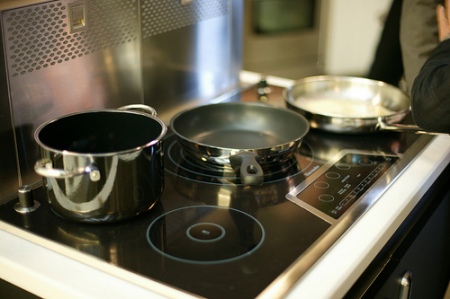| appliance resource center |
what’s better: gas or electric cooking?
Hands down, the majority of people would get a gas cooktop or range if given the choice.
We watch celebrity chefs use them on TV, we’ve heard about the power and for some, we like seeing the flame getting bigger or smaller when we turn the knob (more about this later).
But what’s better? You might be surprised.
When our sales associates attend product training, some brand representatives place pots of water on adjacent gas and electric cooktops with the question, “Which will boil faster?”
The newer associates often balk at this question and quickly answer gas. But lo and behold, the pot on the electric burner boils first (that’s generally the case until you get into pro-style cooking).
Electric? Really?
Yes, really.
It doesn’t look as cool, but the power is there. Gas still trumps electric cooking in the responsiveness of its burners (this is the part about the size of the flame).
For example, if a recipe calls for a dish to be brought to a rolling boil and then be brought down to a simmer, it will take an electric burner longer to decrease its temperature down to the lower heat setting. So, you could find yourself moving your pan to another burner so you won’t ruin your dish.
In gas, you turn the burner down to simmer, and the heat decreases — just like that. Some gas burners also can simmer at a lower BTU, which can be important for cooking sauces and melting chocolate.

The real winner, though, is induction cooking.
- Induction cooking delivers the best of both worlds: speed, responsiveness and power.
Plus, because induction cooking only heats the pan, there’s very little heat loss, making induction often the most energy-efficient choice.
The smooth, electric surface is also a lot easier to clean than ceramic grates. Downsides do exist in induction cooking.
The price point is a little higher, you can only use magnetic pans (ex: coated cast iron), it’s not as professional looking as gas, and there are fewer options available per brand — especially when purchasing a range.
If choosing gas or electric (or induction), it’s good to consider your lifestyle. Do you mostly prepare quick meals or do you cook more complicated and delicate recipes? Is ease of cleaning a concern?